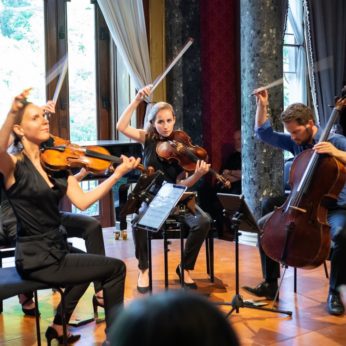Composer: Grazyna Bacewicz (b. 1909 - d. 1969)
Performance date: 29/06/2018
Venue: Bantry Library
Composition Year: 1950-51
Duration: 00:20:43
Recording Engineer: Tom Norton, RTÉ
Instrumentation: 2vn, va, vc
Instrumentation Category:String Quartet
Artists:
Dudok Quartet Amsterdam Judith van Driel [violin], Marleen Wester [violin], Marie-Louise de Jong [viola], David Faber [cello]) -
[quartet]

Dudok Quartet Amsterdam
Judith van Driel, Marleen Wester [violins]
Marie-Louise de Jong [viola]
David Faber [cello]
Gra?yna Bacewicz [1909-1969]
String Quartet No.4 [1950-51]
1. Andante – Allegro
2. Andante
3. Allegro giocoso
The Polish composer, Gra?yna Bacewicz, lived through the upheavals of war, invasion, occupation and repression that her country suffered throughout the twentieth-century. She was one of four siblings born to her Polish mother and Lithuanian father. It was a creative household with three of the four children becoming significant musical figures and the fourth a writer, their lives conditioned by the shifting political and military events of their time. Gra?yna was an outstanding violinist and pianist and she pursued an intensive performance career in the interwar and postwar period, meeting with both critical acclaim and enthusiastic audiences throughout Europe. She was praised particularly for her exquisitely pure intonation, her utmost rhythmic precision and perfect sense of musical form.
Her Fourth (of seven) Quartet dates from the early fifties, a time when the regime followed the Soviet line of art for the masses known as Socialist Realism, effectively an exhortation to write good tunes or to raid folk music. Bacewicz succeeded in ignoring such pressures and almost single-handedly succeeded in keeping the string quartet genre alive in the miserable postwar decade. The Quartet’s opening movement is a study in violent contrasts as the tempo successively quickens and falls, moving from elegiac introspection to a wild aggression. This is powerful music that veers unpredictably from one voice to another, anger, mystery, sadness can all be heard – the voice of Poland, once again under the Russian yoke.
The Quartet opens mysteriously, feeling its way into the surprisingly gentle first subject, that is violently interrupted by slashing chords (Allegro energico) before the opening ideas are revisited. The second subject, melancolico, piano, dolce, presents us with the cello imaginatively cradled in a background of hushed tremolandi violins and pizzicato viola; this peaceful interlude is contrasted with a lively Allegro that leads back to a surprisingly orthodox recapitulation.
The central Andante is a haunting Nocturne, whose softly spoken theme seems to float on stage, gradually growing in intensity until a new idea with a pulsating accompaniment takes over, A brief central section makes attempts at fugato, but quickly gives up. Textures throughout are delicate occasionally expanding to create short passages of rich harmonic density.
The light-hearted rondo finale is like an irrepressible jig, the Polish traditional oberek, whose high spirits makes for a rousing dance. Characteristically Bacewicz allows enticing new ideas to interrupt the flow including a pizzicato version of the dance. It all ends in a boisterous coda.
Francis Humphrys
Copyright © 2024 West Cork Music. All rights reserved.
Designed and developed by Matrix Internet